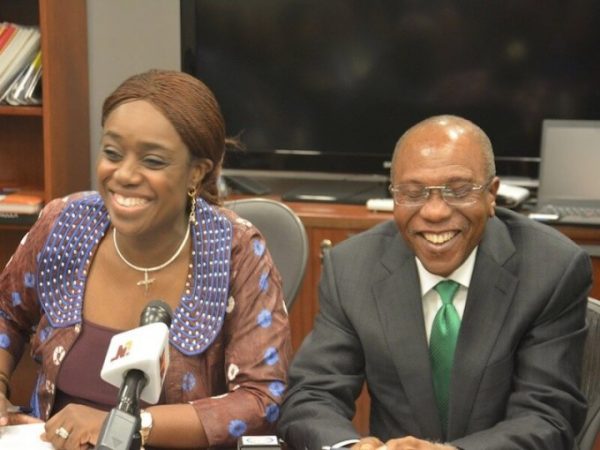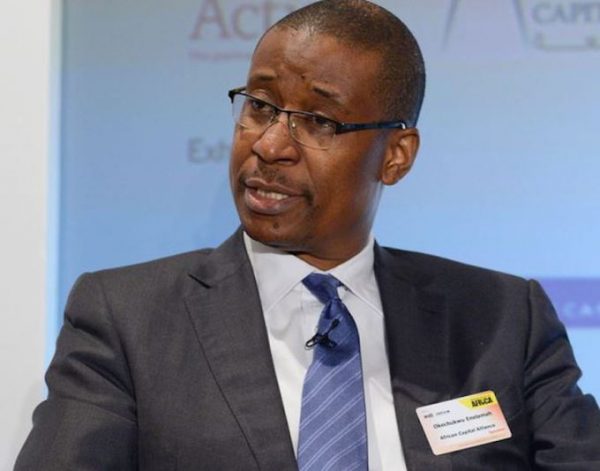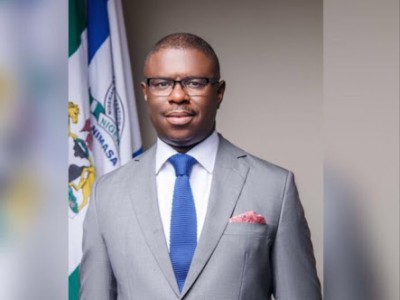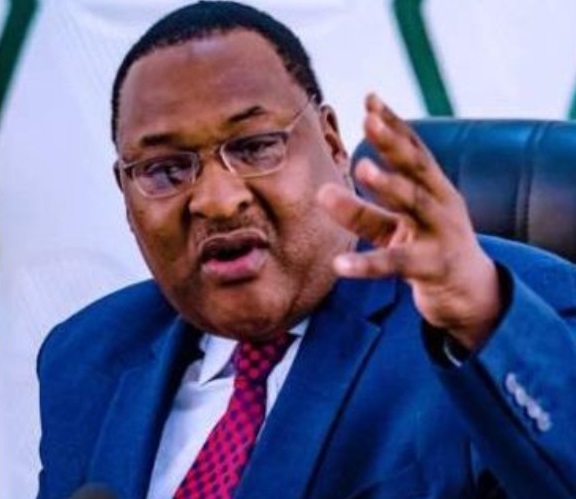We Did Not Shun Foreign Investors, Say Adeosun, Emefiele
After being called out by the Emir of Kano, Alhaji Sanusi Muhammad Sanusi II on Saturday for not being present at a U.S.-Nigeria Investment Summit in Washington D.C., the Minister of Finance, Mrs. Kemi Adeosun and Central Bank of Nigeria (CBN) governor, Mr. Godwin Emefiele, yesterday gave reasons why they were not at the summit.
Sanusi had criticised Adeosun, Emefiele, the Minister of Science and Technology, Dr. Ogbonnaya Onu, Minister of Agriculture and Rural Development, Chief Audu Ogbeh, Minister of State for Petroleum Resources, Dr. Ibe Kachikwu, Minister of Mines and Steel Development, Dr. Kayode Fayemi, and the Minister of Power, Works and Housing, Babatunde Fashola, for not being at the event despite their presence in Washington D.C. for the IMF/World Bank meetings.
He had said he arrived the venue of the summit only to discover that top government officials had not arrived and had to wait in the ambassador’s reception and yet they never turned up.
But in a briefing yesterday in Washington D.C., Adeosun and Emefiele said the summit was not part of their schedule in the U.S. capital and they were only informed about the summit when they arrived the U.S.
Adeosun, in particular, added that she was attending a meeting of the International Monetary and Financial Committee (IMFC), which is the fund’s highest decision-making body of the IMF.
As the representative of 23 African countries on the IMFC, she explained that there was no way she could have left the statutory meeting for US-Nigeria summit.
According to her, one of her responsibilities at the IMFC is to issue a statement on behalf of those 23 countries, which include the Anglophone countries – South Africa and Mozambique, among others.
“There has been some controversy over scheduling. I wasn’t due at any other event. My schedule is what I must adhere to. I think maybe there were some scheduling challenges,” she said.
On his part, Emefiele stressed that what takes pre-eminence at the IMF-World Bank meetings are the meetings by central bank governors and ministers of finance from member countries.
Emefiele added: “I think it is important for me to say this. When I arrived in Washington, the officials of the (Nigerian) Embassy spoke with me that there was going to be a U.S.-Nigeria Summit and I said I will check my schedule because I wasn’t consulted when this summit was being organised.
“What one would have expected is that they (organisers of the summit) would have checked my schedule and that of the finance minister if they thought that our presence at the summit was very necessary.
“They could have checked our schedules to see that there was no conflict. I sit here to say the US-Nigeria summit was meant to hold between 2 p.m. and 3 p.m., whereas the World Bank committee plenary session, which is an assembly of ministers and governors of central banks was to hold between 2.45 p.m. and 5 p.m.
“There was no way the finance minister and myself could have been there. But I think it is important to say it is unfair for people to begin to cast aspersions without understanding our schedules.
“The main reason we are here is because of the statutory meetings of the IMF and World Bank. I felt I should explain this. We are not irresponsible people.”
Continuing, Emefiele apologised to the investors that attended the summit but did not meet top government officials who were in Washington.
He, however, pointed out that the Nigerian delegation met with some investors on the sidelines of the IMF/World Bank meetings.
Adeosun and Emefiele’s explanation on their absence at the investment summit was collaborated by a source at the Nigerian Investment Promotion Commission (NIPC) who said the organisers had also included the executive secretary, Mrs. Yewande Sadiku’s name as a speaker at the event but she was never notified of it.
“Mrs. Sadiku’s name was included as a speaker at that summit but she was never informed by the organisers. Meanwhile, she attended the Commonwealth Business Forum in London and came back to Nigeria without heading for Washington because she was unaware of the summit,” he said.
Emefiele, during the briefing, put the present value of the country’s external reserves at $47.93 billion, noting, however, that there was need to save for the rainy day and also continue to grow the foreign reserves.
He said it would be like saying the focus on inflation, the gross domestic product and exchange rate do not mean anything.
“We came to a meeting where one of the important issues that was discussed was the need to save for a rainy day and we must continue to rebuild reserves.
“That means that Nigeria’s decision to rebuild its reserves from as low as $23 billion in 2016 to almost $48 billion today was a decision in the right direction.
“So, we are going to continue to do so. If we had more reserves when we were hit by the exogenous shocks, we would not have suffered the recession that we suffered.
“And there is a very strong likelihood that there could also be reversals. The finance minister talked about US Fed normalisation – the interest rate could go up.
“And when the interest rate goes up in that environment, what happens is the emerging and frontier markets would lose those monies.
“So, we need to be able to prepare ourselves in the event of a reversal, so that when it happens we would be able to withstand the shocks and not be caught pants down again,” the CBN governor said.
He also signalled the possibility that the central bank could begin to ease monetary policy soon, even though inflation pressures still remain a concern.
He reiterated that the central bank was targeting either a very low double-digit inflation rate or a high single-digit rate in 2018.
Nigeria’s inflation recorded a significant decline to 13.34 per cent in March 2018.
In addition, Emefiele disclosed that in a bid to drive financial inclusion, the central bank and other stakeholders would in the next few weeks, come up with a framework for mobile banking.
“We are taking a study of some of the models in different jurisdictions and I believe that by the middle of next month, a final framework would be released, under which we can ramp up mobile money and financial inclusion in Nigeria.
“We are going to come up with a structure that is Nigerian and not just going to copy what they are doing in other jurisdictions. What is good for Nigerians is what we would come up with,” he said.
Speaking further, Adeosun said the present growth outlook contrasted with the outlook in 2015, stating that inflation was slowing down while the foreign reserves were rising.
Expressing optimism on the federal government’s sustenance of the growth trajectory, the minister, however, called for vigilance and focus for the country not to fall back into recession.
She said: “We are confident that if we diligently implement our economic plan, we will grow the economy. We have room to grow but other countries do not have room to grow.
“By 2019, the growth will be far more robust than the present level in 2018. We are therefore very optimistic about sustaining Nigeria’s economic growth. We are going to use this opportunity to grow our fiscal buffers, particularly aggressively, growing our revenue base.
“The administration has succeeded in building macroeconomic resilience for Nigeria, particularly revising the funding mix, rebuilding fiscal buffers, enhancing foreign exchange reserves and focusing on import substitution strategies,” she said.
She added that the federal government was also focusing its attention on ways to aggressively ramp up revenue in the country.
According to her, the Common Reporting Standards, which would enable the government to obtain taxpayers’ account details directly from banks, would force multinational companies operating in the country, firms and individuals to pay tax.
“The key thing is that the volume of companies that are not complying is significant. And we need to build our capacity in that area for us to track them.”
On state-run enterprises such as the Nigerian National Petroleum Corporation (NNPC), she disclosed that the government would continue to efficiently and effectively manage their costs and plug leakages.
“We must make sure every money that is earned comes in. We will drive the process of improving governance.
“We are refinancing our inherited debt portfolio from short-term treasury bills to longer tenored debt, which has resulted in huge savings and a reduction in the cost of funds for the government,” she added.
The finance minister disclosed that the Voluntary Assets and Income Declaration Scheme (VAIDS) deadline was extended by three months till June 30 due to appeals by taxpayers for more time to regularise their tax status.
She revealed that the present administration had raised the taxpayer base from 13 million in 2015 to 17 million this year.
Adeosun also confirmed the recovery of $322.515 million Abacha loot from the Swiss government into a special account in the CBN.
The money, according to her, has been earmarked for the National Social Safety Net programme of the federal government.
“The objective of the National Social Safety Net programme for Nigeria is to provide access to targeted transfers to poor and vulnerable households under an expanded national social safety net system,” she stated.
Buhari Tackled over Ministers’ No Show
Meanwhile, the opposition Peoples Democratic Party (PDP) has challenged President Muhammadu Buhari to explain why his ministers and other government officials allegedly abandoned the scheduled meeting with investors in Washington “to gallivant in the U.S. capital”.
The party said the ministers reportedly abandoned the foreign investment summit and went on shopping sprees in highbrow shops of the U.S. at the time Nigerians were looking up to them to negotiate deals and bring in investments into the country.
In the statement issued yesterday by the PDP National Publicity Secretary, Kola Ologbondiyan, PDP described the incident as an “embarrassing development and indeed a clear reflection of the recklessness and laissez-faire attitude of the Buhari-led All Progressives Congress (APC) administration towards governance, resulting in the biting economic recession and other woes plaguing our nation under President Buhari’s watch”.
“It is now clear to Nigerians why the APC and its incompetent federal government have not been able to attract any meaningful foreign direct investment to the country in the last three years of President Buhari’s administration. Instead, the ones it inherited are pulling out.
“How can APC government officials, sent to attend investors’ meetings, abandon their duties and engage in personal leisure abroad? Painfully, they blame everybody but themselves for the choking economic situation of the country in the last three years.”
PDP said it believed that these government officials had the temerity to pursue personal interests across the U.S. because they knew that even if their atrocious act were brought to the attention of the president, he would claim ignorance.
“This is more so as Mr. President himself brought no dividend from the Commonwealth Heads of Government Meeting (CHOGM), where he de-marketed our nation with negative utterances.
“We therefore urge the National Assembly to spare no rod but to immediately summon the ministers named in the saga, including Chief Audu Ogbeh (Agriculture), Dr. Ogbonnaya Onu (Science and Technology), Alhaji Lai Mohammed (Information) Babatunde Fashola (Power), Dr. Ibe Kachikwu (Minister of State for Petroleum Resources), Kemi Adeosun (Finance) and Kayode Fayemi (Solid Minerals).
“It is now clear to all that the APC does not have the interest of our country at heart and Nigerians must spare no efforts in joining forces with the PDP to vote them out and reinstate a purposeful and productive administration, come 2019,” it said.
Thisday








